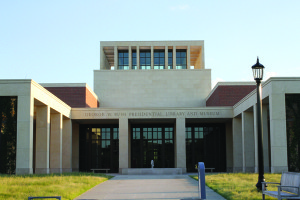
The government shutdown went into effect Tuesday at 12:01 a.m. after the House and Senate failed to pass a budget by the Oct. 1 deadline. Now, federal employees across the country are temporarily without jobs — and pay — including many at the Bush Library and Museum.
After days of speculation, optimism on the part of Bush Center President Margaret Spellings, as reported in The Dallas Morning News, and no comment by former President George W. Bush, the doors to both the Presidential Library and Museum were locked Tuesday morning.
Political Science Professor Matthew Wilson said that the closure of parts of the Bush Center (the Institute and other foundation-run portions remain open) should be some of the only direcet backlash to the SMU community, save those families employed by the federal government.
“The immediate impact of the shutdown for most people, both in Dallas and nationally, will be minimal,” Wilson said. “I suspect that this impasse will be resolved fairly quickly.”
With the U.S. government on hold until resolutions are reached, and with the economy taking a hit with each passing day of the shutdown, Wilson believes a solution will be reached “in a matter of days.”
“Republicans will pay too high a political price if it persists longer than that,” Wilson said. “Polls show that most Americans are with them in opposing Obamacare, but also that most think [a shutdown] is the wrong way to address those concerns.”
Wilson explained one likely end to the stalemate would “seem to be a bill to fund the government in exchange for a promise of a separate” vote that would delay the “implementation of Obamacare.”
“This would … force Democratic Senators to stand up and be counted in favor of moving ahead with the unpopular healthcare law which is what many Republicans want,” Wilson said.
Professor and Director of SMU’s Center for Presidential History Jeffrey Engel spoke to the standoff between the president and Congress now unfolding from the perspective of roles and perceptions of each.
In D.C., it appears to be a question of either a refusal to negotiate or an insistence by the President to stand behind decisions.
“[Americans] want a President to be strong, decisive and to stand his ground,”
Engel said.
Whether one places blame on congressional members or the President Barack Obama, Engel explained that, “neither side will come out of this with a
shining reputation.”
“They will all be tarnished to some extent by their inability to complete the basic functions of government,” Engel said. “The last time there was a government shutdown of this magnitude, the president is likely to appear in the end bigger and more powerful by sticking to his stated agenda.”
Instead, based on patterns of history and perspectives on power roles of the nations leader versus a body of varied representatives, Engel said the legislators blocking the budget on the basis of Healthcare “are likely to appear petty, unprofessional, and ultimately less interested in the public good.”
“History does not treat roadblocks to progress kindly,” Engel said.











